Bank ground, Coniston, Ambleside. At Coniston reading and resting; discusses the well-regulated family of Charles Benjamin Tayler and their scheme of education; thinks studying the “dark sciences” will repay investigation.
Litchfield, Richard Buckley (1832-1903) Barrister Clerk to Ecclesiastical CommissionersPenicuik. Writes after leaving Cheltenham, describes leisure activities at Peniciuk: dog racing, walks, and snowball fights.
Litchfield, Richard Buckley (1832-1903) Barrister Clerk to Ecclesiastical CommissionersTrin. Coll. [Robert Henry] Pomeroy has formed a swimming club at Cambridge; has been busy with electrical reading this term and is working to come up with appropriate ideas, has been ‘sifting’ the theory of light and making everything stand upon experiments and definite assumptions, describes the difference between dogs eyes and human eyes.
Litchfield, Richard Buckley (1832-1903) Barrister Clerk to Ecclesiastical CommissionersTrin. Coll. Gives a report of Robert Henry Pomeroy’s illness; is busy with questionists regularly now, is about to get out some optical things to show them; has heard nothing from Cheltenham, Moderator [William Henry] Besant is recovering the use of one side of his face.
Litchfield, Richard Buckley (1832-1903) Barrister Clerk to Ecclesiastical CommissionersTrinity. Discusses plans to visit London; is looking through papers for some things not to be burnt, notes some are soft and good for packing; will take the Northwestern route to the north, notes that “the transition state from a man into a Don must come at last and it must be painful.”
Litchfield, Richard Buckley (1832-1903) Barrister Clerk to Ecclesiastical CommissionersGlenlair. Talks of plans and the amount of work to do at Glenlair, is fitting up a colour weaving machine fit for transportation, his top for doing dynamics; is studying the problem of Saturn’s Rings.
Litchfield, Richard Buckley (1832-1903) Barrister Clerk to Ecclesiastical CommissionersGlenlair. Discusses travel plans, invites him to visit, is looking for a tutor for a friend’s two boys.
Litchfield, Richard Buckley (1832-1903) Barrister Clerk to Ecclesiastical Commissioners18 India Street, Edinburgh. Describes his travels, including coming to the rescue of a woman afraid of some Wolverhampton revellers on the journey there, visits to family, mentions he was photographed four times at Peniciuk because of the light levels; J. F. MacLennan has been getting on with his “Law.”
Litchfield, Richard Buckley (1832-1903) Barrister Clerk to Ecclesiastical CommissionersGleinlair, Springholm, Dumfries. Describes a quiet life at Glenlair, and that he has not had a mathematical thought for a fortnight but is likely working subconsciously, shares news of friends and asks for more, notes how different his different his society is in Aberdeen.
Litchfield, Richard Buckley (1832-1903) Barrister Clerk to Ecclesiastical CommissionersGlenlair – Reacts to news of Robert Henry Pomeroy’s death in the Indian rebellion and reflects at length on memory and grief; a little girl in one of his men’s houses has died; is at home for a month with his aunt Mrs [Isabella] Wedderburn.
Litchfield, Richard Buckley (1832-1903) Barrister Clerk to Ecclesiastical CommissionersGlenlair. His aunt Mrs Wedderburn has learned of the murders of her cousin John Wedderburn and his wife and child in the Indian rebellion, and her son John and his wife in Moultan have had to disarm troops and dismiss others; is glad to have read the letter [Robert Henry Pomeroy’s last?]; reflects on Good and Evil; has almost finished with his work on Saturn’s Rings; illness continues in the house of the little girl who died.
Litchfield, Richard Buckley (1832-1903) Barrister Clerk to Ecclesiastical Commissioners129 Union Street, Aberdeen. Describes his work in Aberdeen, has found better textbooks by Galbraith & Haughton; has got up a model to show the motions of the rings of satellites; shares what he has been reading; comments on the Senior Wranglers and Smith’s prize men, has a student that he hopes will stay out of a small college “where boating billiards beer &c are more immediate paths to distinction that the pursuit of wisdom either mathematical, classical or social.”
Litchfield, Richard Buckley (1832-1903) Barrister Clerk to Ecclesiastical Commissioners129 Union Street, Aberdeen. Is pleased with the position at Aberdeen; reflects on his marriage [to Katherine Mary Dewar]; answers Litchfield’s questions with what he describes as a "metaphysical screed;" he gives his opinion on Catholics; a section apparently about marriage has been cut out; sends a paper set for his class and reflects on the quality of answers to the questions.
Litchfield, Richard Buckley (1832-1903) Barrister Clerk to Ecclesiastical CommissionersGlenlair. Has been at Aberdeen, is now on holiday with friends, invites Litchfield, mentions friends Robert Henry Pomeroy and Wilfred Lucas Heeley, discusses different ways of summing up the personalities of friends.
Litchfield, Richard Buckley (1832-1903) Barrister Clerk to Ecclesiastical Commissioners146 letters, most of them replies to invitations to dinner, with a few concerning arrangements to stay in rooms in College for the night, sent to the Master and Fellows of Trinity College, or specifically to Henry Montagu Butler, John Walton Capstick, Hugh McLeod Innes, or William Aldis Wright. An original letter of invitation may be found as part of item 65.
Thirteen of the letters concern other matters related to Trinity College business, as described below.
Items 9-11: Blomfield, Sir Arthur William. Asks to use the College Hall for lunch for the Royal Academy Club annual excursion, June 1899
Item 19: Dalzell, Robert Harris Carnwath, 11th Earl of Carnwath. 7 Jan. 1899. Remittance for fees, deducting a fine incurred by his son which should be paid for by the culprit
Item 40: Devonshire, Duke of. Undated. Contribution to the Trinity College, Cambridge Mission Appeal.
Items 61-62: Jebb, Sir Richard Claverhouse. 1896, 1898. Encloses payment for his subscription to the Trinity College Mission and the Cambridge House
Item 84: Parry, Sir Charles Hubert Hastings, 1st Baronet. 1898. Encloses payment for dues
Items 100-101: Sidgwick, Eleanor Mildred. 25 Mar. and 1 May 1899, encloses lists of students and other women from Newnham who would like to attend the Rayleigh lecture
Item 108: Stanton, Vincent Henry. 3 Sept. n.y. Concerning the opening times of the Trinity College Library
Item 123: Webster, Richard Everard, 1st Viscount Alverstone. 19 July 1897. Encloses cheque for subscription.
Item 126: Whitehead, Alfred North. 21 Oct. n.y. To Capstick, asks for questions for the General Question paper
One letter appears to be personal, not Trinity College business: item 90, sent to John William Capstick by Georg Hermann Quincke 15 July 1896, who writes about electric currents, citing articles, and describing his overcrowded laboratory (in German).
58 letters addressed to "My dear sister".
Newton, Ann (c 1801-1879) sister of William WhewellThe first two of five boxes containing letters from William Whewell to his family, Add.MS.c.191-193, arranged roughly chronologically.
Newton, Ann (c 1801-1879) sister of William WhewellThe third and fourth boxes of five containing letters from William Whewell to his family (Add.MS.c.191-193), arranged roughly chronologically.
Newton, Ann (c 1801-1879) sister of William WhewellThe fifth of five boxes containing letters from William Whewell to his family (Add.MS.c.191-193), arranged roughly chronologically.
Newton, Ann (c 1801-1879) sister of William WhewellIncludes a letter from J. D. Gregory, 31 Oct. 1907 and a letter from Charlotte Warre Cornish dated 3 Oct. 1899.
WW rejoices 'especially in Lord Lansdowne's mode of approbation' over RJ's book ['An Essay on the Distribution of Wealth, and on the Sources of Taxation: Part 1. - Rent', 1831]. He has received his proof sheets from the British Critic ['Review of An Essay on the Distribution of Wealth and Sources of Taxation by the Revd Richard Jones', The British Critic, Quarterly Theological Review and Ecclesiastical Record, 10, 1831]: 'I think I will not send you them. I do not like them at all but shrink from the task of altering them so as to make them good'. William Buckland and his wife are coming to stay next week.
Trinity Lodge - WW has read RJ's lectures and is ready to discuss them with him: 'They appear to me to be full of the most valuable matters, delivered in most places with great force. But I think they may and ought to be made a little more symmetrical and methodical'. RJ should draw up an analytical table like the one WW suggested for the first five lectures [see WW to RJ, 28 March 1852]. There is a review of WW's lectures on morality in the Westminster Review ['Lectures on the History of Moral Philosophy in England', 1852, and 'Elements of Morality, including Polity', 1845, Westminster Review, October 1852]: 'It is plainly John Mill and I am rather amused to hear what is the amount of what can now be said of the best of Bentham's [Jeremy Bentham] school in favour of their master'. Mill wants to put the result of their controversy on the following issue: 'Whether the pleasures of animals - pigs, geese, lions for instance - are of the same moral value as those of man. He says yes, I say no. As to other matters he accuses me, as I accuse Bentham of reasoning in a circle'.
Brasted - RJ has received a very positive letter from Lord Lansdowne concerning RJ's book ['An Essay on the Distribution of Wealth and the Sources of Taxation', 1832]: 'he had read it with the attention it so eminently deserves'. Having thus read the book he concluded that they [Ricardians] had fallen 'into error by reasoning too much from narrow grounds and that he values proportionably better views - sound inductions etc.'. Lansdowne wants RJ to call on him when in London. 'I am pleased - it is a good and leading opinion gained and apparently strongly gained and apparently strongly pronounced and you whose reputation is more than half committed to the book will not I am sure be above being pleased too'.
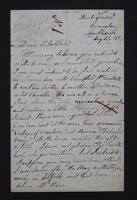
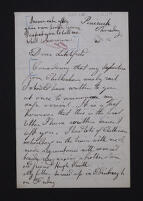
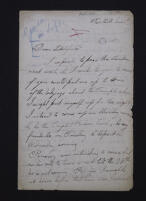
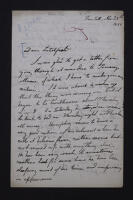
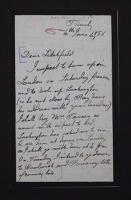
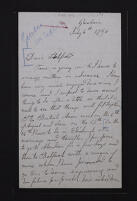
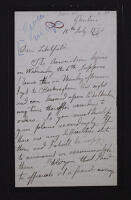
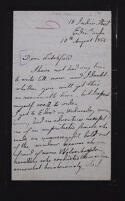
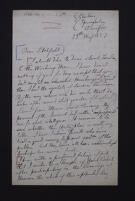
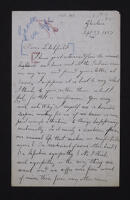
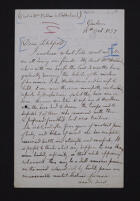
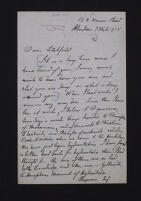
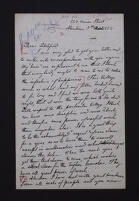
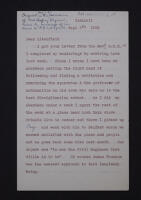


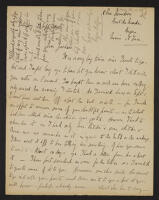
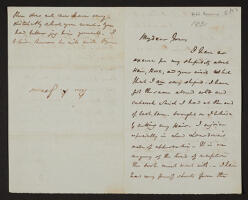
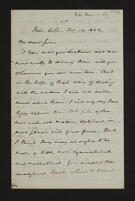
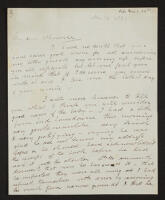
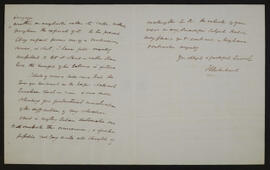
![Letter from Mrs J. G. Lockhart [Charlotte Sophia Lockhart] to Mrs [J.] Marshall](/uploads/r/trinity-college-library/6/4/1/6418df14260097807065ada1ac7634f6208cbd2bd5af34613d763e84b54d850d/Add.ms.c.87_28_thumb.jpg)
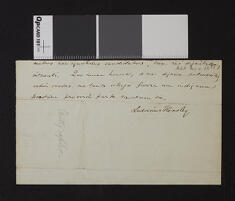

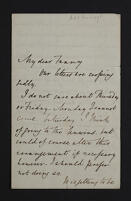
![Letters from Robert Leslie Ellis to [William] Walton](/uploads/r/trinity-college-library/8/f/3/8f30ec493294eb4cc692d2891708084e56bc00f545bfddcd5a1db6ebf9c42b06/Add.ms.c.67.10-88_thumb.jpg)
![Letters from Robert Leslie Ellis to [William Whewell]](/uploads/r/trinity-college-library/f/c/7/fc7598777cae689b4e92dce42769a8471f5b536862917b31965982971f6f7ebe/Add.ms.c.67.100-108_thumb.jpg)